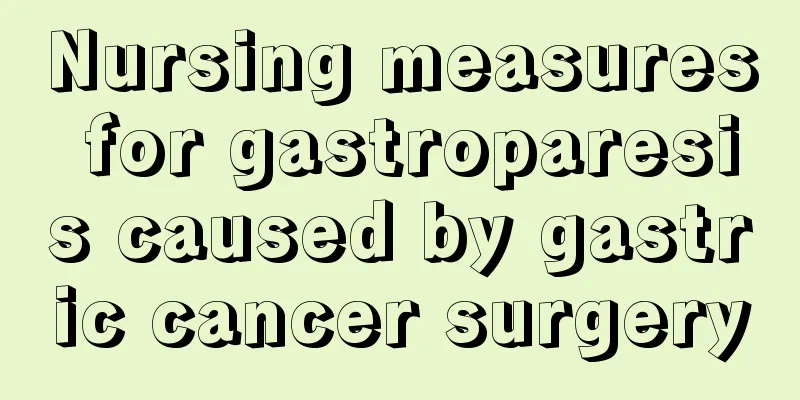Nursing measures for gastroparesis caused by gastric cancer surgery

|
Gastroparesis is a common complication after surgical resection of gastric cancer. Patients mainly experience gastrointestinal digestive dysfunction, such as abdominal distension, nausea, vomiting, etc. Relevant care should be provided to patients after surgery to avoid aggravating the condition. Gastrointestinal decompression tube care In the early stage after gastric cancer surgery, due to anesthesia and other reasons, the patient's residual stomach cannot discharge gastric contents in time, which is prone to retention and dilatation of the residual stomach. Therefore, it is necessary to fast in time and continuously and effectively perform gastrointestinal decompression to relieve symptoms and improve the treatment effect. Keep the gastrointestinal decompression drainage tube unobstructed, avoid folding, twisting, and falling off, pay attention to observe and record the nature and color of the drainage fluid, and flush and clean the drainage tube regularly every day. Parenteral Nutrition Nursing Patients with gastroparesis have some difficulty in eating orally and need parenteral nutrition to supply the body with appropriate amounts of vitamins, trace elements and electrolytes, maintain internal environment stability and protect cell function. Pay attention to the rational allocation of nutrient solution, which is generally prepared by doctors or nutritionists. At the same time, closely monitor the patient's weight and hemoglobin level, and adjust the amount of nutrient solution in time. Daily diet care As the condition improves, a gradual diet plan should be developed for the patient, based on the principle of eating small meals frequently and mainly liquid food. The patient can start with 20 mL and gradually increase to full liquid food. The increase should be based on the principle of keeping the patient without discomfort. The liquid food should mainly be unsweetened rice soup and vegetable soup. The patient should sit or semi-recumbent after meals to promote gastric emptying. Promoting gastric motility recovery care The anastomosis of the residual stomach of patients with gastroparesis is often accompanied by congestion and edema. Gastric lavage with hypertonic saline twice a day can reduce anastomotic edema. Gastrokinetic drugs can be used as prescribed by the doctor, such as oral domperidone or the traditional Chinese medicine Dachengqi Decoction, to enhance gastrointestinal motility and promote the gradual recovery of digestive function. |
<<: A proven Chinese medicine recipe for treating ascites caused by liver cancer
>>: Foods that help enhance the immunity of patients with lymphoma
Recommend
What kind of exercise is good for people with prostate cancer?
Prostate cancer refers to an epithelial malignant...
What does hc refer to in the fetus?
When pregnant women go to the hospital for prenat...
What are the benefits of massage and cupping
Many places have massage and cupping as a health ...
My skin is a little red and itchy after washing my face with cucumber
Cucumber is the common cucumber in people's d...
Medicine for facial paralysis
Facial paralysis is a relatively common disease a...
4 steps after meals can help prolong life
For the elderly, the time after meals is a very i...
How to treat and remove acne caused by blood heat
Acne is generally related to endocrine disorders ...
What is the most effective way to treat liver cancer? The three magic weapons for treating liver cancer
What are the three magic weapons for treating liv...
Is it necessary to quit smoking to prevent bladder cancer? Is bladder cancer related to lack of drinking water?
Bladder cancer is the most common malignant tumor...
What is keloid?
Keloid is a relatively common skin disease, also ...
Is there a family genetic gene for esophageal cancer?
Is there a family genetic gene for esophageal can...
How to test vital capacity
Insufficient lung capacity will have a certain im...
What are some ways to grow taller at the age of seventeen?
Boys and girls grow taller at different ages. Usu...
Why does it still hurt after shingles healed
Shingles is a relatively common disease. Its most...
Can ovarian tumors be inherited?
Can ovarian tumors be inherited? The ovaries are ...









